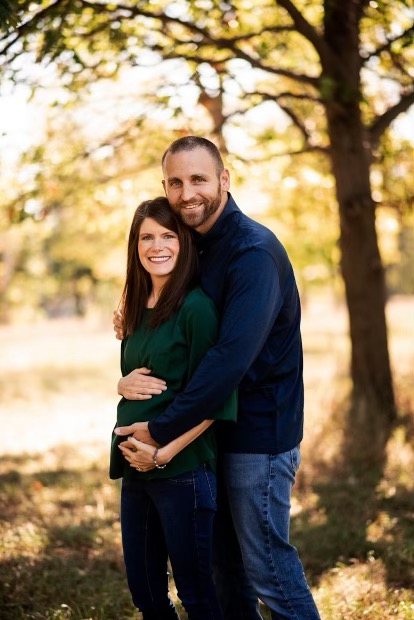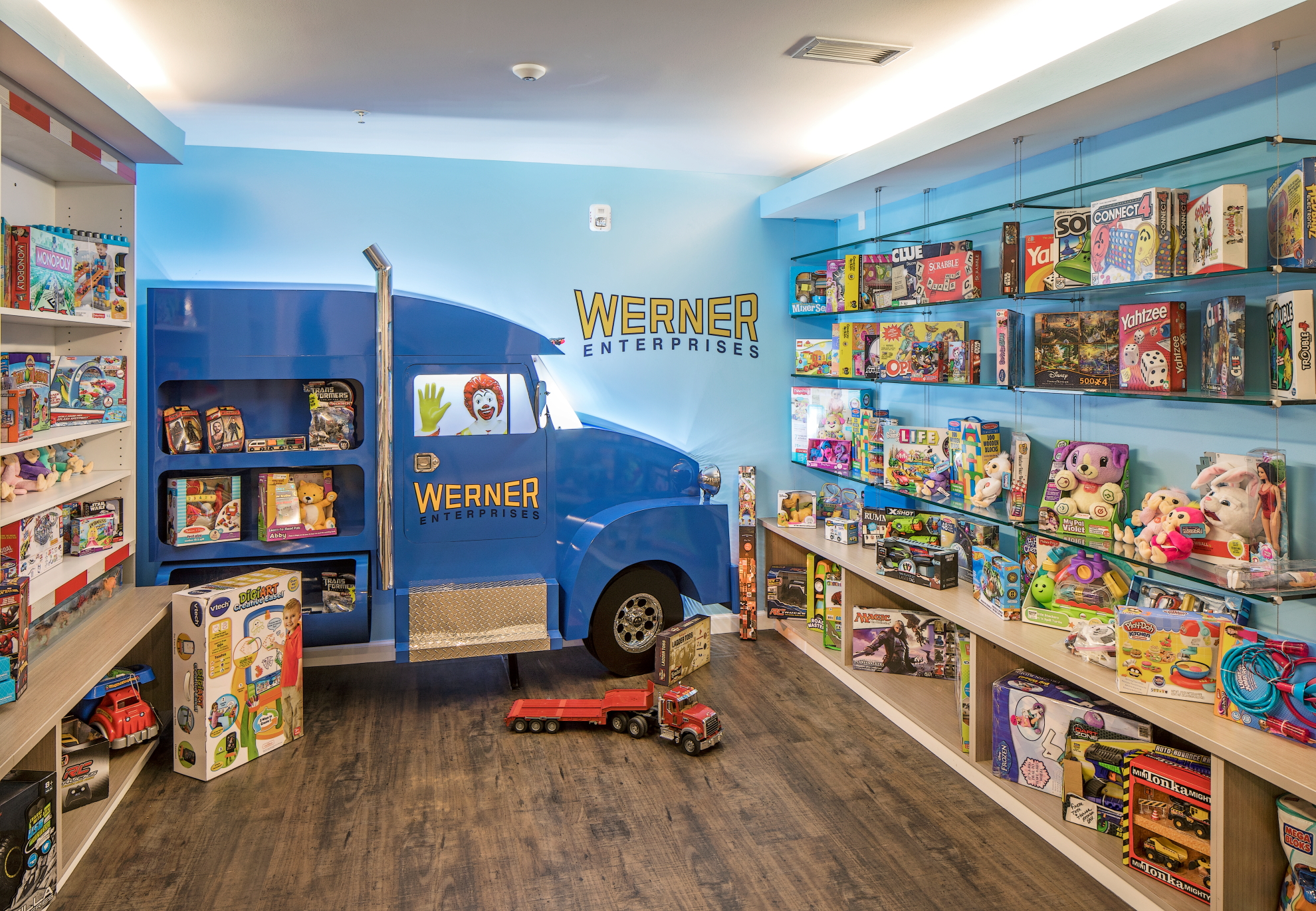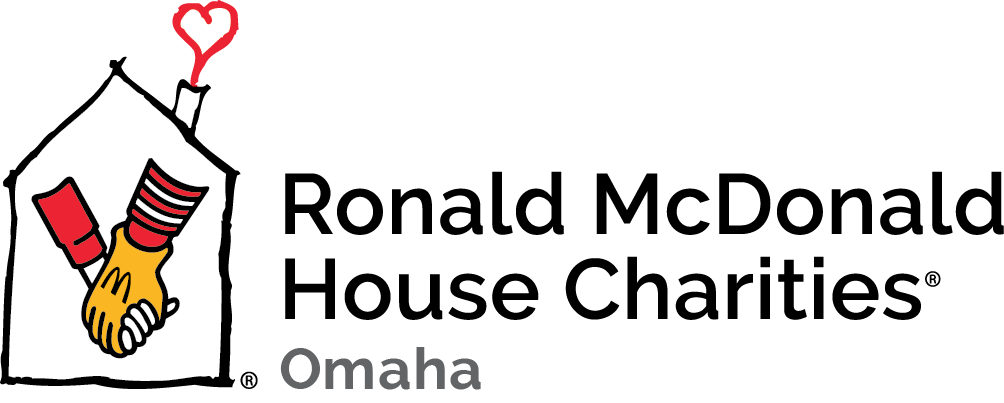Overwhelmed
Families who must travel for a child’s medical care often face myriad obstacles. Isolation. Unfamiliar settings. Equally important obligations can pull siblings and parents apart, geographically, and emotionally. Even something as seemingly minor as where to launder clothes can become a logistical and mental burden, all while dealing with the anguish and uncertainty of a child’s diagnosis.
It is utterly overwhelming.
Living in Aurora, Nebraska, the Werners are a tight-knit family. Parents Courtney and Spencer enjoyed spending time with their three kids, all between two and eight years of age. But last year, they felt blessed to learn their small circle would get to expand a bit more. Courtney was pregnant, and twins were on the way.

Her doctor was in Grand Island, roughly a half-hour’s drive from Aurora, but after learning the twins were identical, along with having a few other high-risk factors, Courtney was informed that not only would the twin girls be born early, but they would also likely need to deliver in Omaha.
That revelation set off a series of emotions for both parents. Courtney recognized the gravity of the matter and understood that this situation carried inherent risks that could multiply without warning. On top of that, Courtney would be away from home, totally out of her element, and away from her husband and older kids. One question raced to the forefront of her mind:
How are we going to do this?
She recalls wondering, “How am I going to be away from [Spencer] and the kids potentially for two months?”
Spencer had those same concerns, while also just hoping the babies would be born healthy. At the same time, he almost felt some relief because he knew the girls would be taken care of at one of the best hospitals in the Midwest, at Nebraska Medicine.
Once they learned they’d need to travel to Omaha, they were able to focus on what they could control. “We were just kind of like, ‘this is what’s happening. We’re going to have to try our best to make the most of it. And the sooner we have a positive attitude, the better off we’re going to be,’” Courtney says.
Everything happened quickly after that. Within a couple of weeks, Courtney and Spencer were headed east on I-80. Briefly after arriving, at 32 weeks, their baby girls were born, both weighing just over three pounds. While premature births are always delicate situations, the twins were fortunate; neither girl had any critical concerns, though they were taken to the NICU for monitoring.
Courtney would be ready for discharge in less than a week. Meanwhile, the twins were also stable, though they still had a bounty of medical equipment connected to their tiny bodies: oxygen mask, nasogastric tube, IV, and sensors hooked up to countless monitors. “It was very overwhelming,” Spencer says.
Still, the doctors did not notice any significant medical issues, so with the girls being cared for, the next step was to figure out where Courtney could stay for the next few weeks, if not months. A social worker at Nebraska Medicine informed them there was a room available at the Ronald McDonald House.
They had heard of Ronald McDonald Houses before, but the Werners weren’t sure what to expect when they walked in the doors. Spencer would need to head back to Aurora, and while he’d be visiting on weekends, on that day he’d be leaving Courtney in a place to which she was unaccustomed, alone. And even though she prefers being at home, Courtney also is a very social person, and she says that, “being somewhere where there’s no one around would not be an ideal place for me.”
The Werners were worried about how this experience could not only affect their family in the moment, but also in the future. Courtney remembers Spencer telling her, at the beginning of this journey, “The three lives that we have at home are still just as important as the two new lives we have welcomed into our family.”
But how could they carry out those words when Mom was going to be away for up to two months, and Dad would be away for weekends? Even if the other kids visited the hospital, how could they feel like kids while needing to remain quiet and not run around the NICU? How would this ordeal shape their memories of their little sisters being born?
Luckily, those questions were answered almost immediately. Not only could the kids stay at the House with their parents during their visits, but they also got to play in the toy room downstairs. They could play in the backyard. And of course, they got to pick out a toy from the glass-enclosed toy store at the front of the House, featuring a truck from, coincidentally enough, Werner Enterprises (no relation).
Spencer says things like that “help make this experience for our kids.” Courtney adds, “This has helped immensely; they feel special when they come here.”
They hope that having those kinds of positive memories will allow the older kids to look back on this time with feelings of joy and happiness to go along with the sadness and worry that accompany this admittedly difficult time.
Beyond the benefits for the older kids, Spencer and Courtney were awed by all the House had to offer. They were welcomed by Chief Program Officer Vicky Sheeler, who “gave me this blanket and a bag with a care package full of stuff,” Courtney says, continuing, “I was just so overwhelmed with all the extra, this place is such a gift.”
They remember receiving a tour, seeing the fully stocked pantry, the 24/7 laundry facilities, and with every step, their hearts were being lifted. Courtney recalls thinking, “this is going to be doable, with the help of this place. This is going to be okay.”
The Werners, though, appreciated much more than the tangible things in the House. “The place itself, and all the amenities and things you offer, it’s all very good, but I think it’s the people that make it what it is,” says Spencer.
Courtney adds, “Everyone from the Ronald McDonald House staff has always been very helpful for me, you can tell that they enjoy their job. They have a huge passion for why they’re here.”
And while Courtney never has a problem starting a conversation – “I could talk to just about anyone,” she says with a laugh – it helps that almost any time she finds her way to the House kitchen for a cup of coffee or some snacks, she’s greeted by a friendly face. “Everyone’s always happy to see you. A smile goes a long way when you’re in a very stressful situation.”
That kindness came not just from the staff, but the volunteers and other families, as well. Spencer calls it, “like a large, multi-family home. You get to know people, there’s a big sense of community, which is huge.”
Recently, another family got to go home, and Courtney remembered feeling such incredible joy for them after building a bond no one ever hopes to need. “Whether you’ve been here a day, whether you’ve been here three months, you’re all here for the same purpose, but [on a] different journey, you know?”
Whether you’ve been here a day, whether you’ve been here three months, you’re all here for the same purpose, but [on a] different journey, you know? – Courtney Werner
For the Werners, their journey has generally progressed as well as could be expected. The girls have continued growing without major setbacks, at the time of publishing they each weighed roughly six pounds, and they only rely on their nasogastric tube to deliver a portion of their daily food intake. Courtney says, “They don’t look like preemie babies anymore.”
Despite the good fortune, they both understand how quickly things could have turned south, and how critical it’s been for them to have a comprehensive support system at the Ronald McDonald House. When asked what it’s been like to go from the fear and uncertainty of those conversations in Grand Island to the hopefulness of today, Courtney’s emotions pour out.
“They look healthy, and we didn’t have any huge [medical issues], but I think it’s knowing in your heart, how much could have gone wrong. You know there’s so many things that could have come up and they didn’t. It’s just such an overwhelming feeling of gratefulness.”
Courtney thinks back to that first question: how are we going to do this?
“It’s amazing what you do when you know you have to do it. How God helps you find the strength you didn’t realize you had.”
They both agree this House has been the best place for that strength to surface. Spencer adds that knowing this is a safe place for his wife, where her health and well-being can be a priority while their girls are cared for in the hospital has helped allow him to cope with everything, while Courtney says her ability to have conversations with others facing similar challenges is why, “this, over anywhere else, is such a gift, because there is community here and people genuinely care. Our hearts were so moved by the compassion that we felt from day one, it’s overwhelming in the best way. It really does touch your heart.
“I can’t imagine being away from home and being somewhere not like this.”
The twins will likely be discharged soon, and the Werner family will be reunited in earnest once more. Doctors have yet to express any long-term concerns, but the long-term impacts of the family’s stay in Omaha appear to be significant.
Courtney says, “I’ve said repeatedly through this experience, with the people here [in the House], the families here, the staff here, the staff at the hospital, it is really reassuring that we are taking our girls home in a world where there are lots of really good people.”
If you’d like to support families like the Werners, please consider making a donation today.
